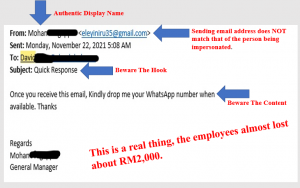In the realm of pressing matters, timely responses are crucial. Have you recently received an email with a subject line suggesting an urgent situation, possibly originating from a manager or department head? These initial emails often mark the onset of a potential scam, with scammers aiming to manipulate recipients into taking immediate action.
These deceptive emails commonly exhibit certain traits that can help in recognition and self-protection:
**1. Brief, Urgent Subjects and Messages:** These emails typically feature concise subject lines like “Are you available?” or “Urgent favor,” accompanied by succinct messages intended to evade spam and phishing filters.
**2. Impersonation of Familiar Individuals:** Scammers often assume the identity of someone known to the recipient, often a person in a position of authority, to enhance the credibility of their deception.
**3. Urgent Tone:** These emails create a sense of urgency, urging the recipient to respond promptly.
**4. Discrepancies in Email Addresses:** The sender’s email address usually does not align with the person they claim to be, and the Reply-To email address often differs from the sender’s address.
To fortify your defenses against such scams, consider these preventive measures:
**1. Exercise Caution with Urgent Requests:** Approach communications with urgent requests from executives with caution, especially if the communication style is atypical.
**2. Validate Sender’s Email Addresses:** Scrutinize the sender’s email address to ensure it matches the claimed identity.
**3. Establish Direct Contact:** Instead of replying directly to the email request, reach out to the purported sender through alternative means, such as a phone call, chat, or in-person conversation, if you harbor doubts about the request’s legitimacy.
**4. Verify Through Established Channels:** Send a separate email to the individual’s known and customary email address to confirm the authenticity of the request.
**5. Question Unusual Financial Requests:** Always exercise scrutiny and verification when dealing with atypical requests for financial transactions, such as wire transfers or gift cards, particularly if they appear to originate from a supervisor or leader.
Scammers leverage a fabricated sense of urgency to heighten the effectiveness of their workplace scams. They recognize that individuals are more likely to prioritize and respond promptly to urgent requests, particularly when they appear to be from higher-ups or colleagues.
Maintaining a cautious approach to such communications is of paramount importance. It is wiser to authenticate the legitimacy of a request and shield oneself from potential scams, even if it entails questioning the validity of a communication from a senior colleague.
We are keen to learn about the preventive measures you have adopted when encountering such scams. Your insights can contribute to helping others remain vigilant and secure in their online interactions.

